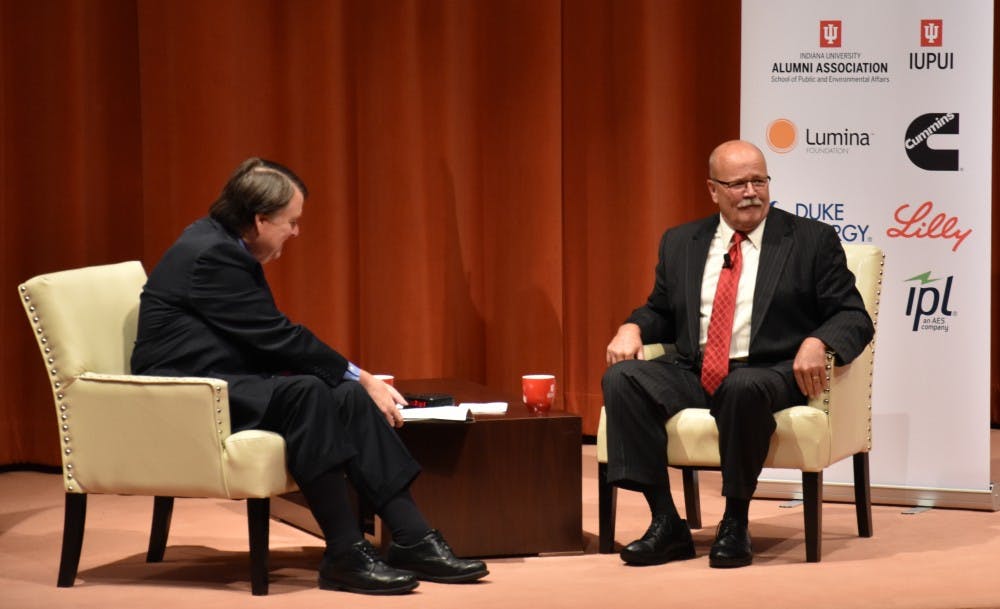The Indiana University Public Policy Institute hosted a forum Aug. 30 to give the candidates running for Indiana governor time to speak on a multitude of issues Hoosiers face in day-to-day life.
It was the first time all three candidates met in one place to discuss their stances. However, candidates were not onstage at the same time.
Former Chief Justice Randall Shepard moderated the forum and drew questions from a report titled Thriving Communities, Thriving State, which was recently published by the institute.
John Gregg, the democratic candidate for governor, was the first to speak.
He shared his opinion on the political atmosphere throughout the country between the Democratic Party and the Republican Party, calling it a “loss of civility.”
At the state level, Gregg believes there are issues that have been turned into politics that shouldn’t be. He cites public education as one of these issues, and went on to say most Hoosiers are in the middle of the political spectrum and not far left or right.
“We need to find that common ground and take the best ideas from democrats and republicans, and I think we [have] lost that,” Gregg said.
One of the key questions considered the number of people in the state with college degrees or certificates and if the state could do anything to boost that number.
The moderator explained that Indiana’s graduation rates in higher education are going up, but other states in the Midwest are seeing the rise too, and many are even ahead of Indiana in that aspect. Gregg believes graduation rates in higher education is a huge issue in the state.
The democratic candidate said he wants to address this problem by giving respect to people with any type of credential, not just those who have a bachelor's or associate's degree.
He also plans on using funds for roads, bridges and trails.
The quality of life for people in Indiana was also important for Gregg, saying that the state should not delve into social issues because it paints Indiana as a place people "don’t want to move to."
Additionally, the candidate plans to work for LBGT rights in the state and help Indiana become more welcoming to minority communities.
“I want everyone to feel like they have a seat at the table,” Gregg said.
Rex Bell, the libertarian candidate for governor, spoke next. The moderator started with questions about the Libertarian Party.
“I think what the Libertarian Party offers is limited government,” Bell said. “We have the idea that people should live their lives as they want.”
The candidate thinks the Democratic and Republican Parties continue to grow the government, and he thinks the libertarians can pull the government back.
When questioned on the lack of libertarian popularity in the state, Bell said it wasn’t necessarily a loss if he was able to raise a cause and raise ideas people haven’t considered in a while.
“Sixteen years ago, they said we are crazy, and now they say we are unorthodox,” Bell said.
When it comes to higher education, the libertarian believes there are plenty of viable ways to make a living.
“I don’t think we need to push a college education as the solution for everybody,” Bell said. “I think we can create opportunities by getting government out the way."
On the topic of race relations, Bell said he believes society has made gains through the generations and society has become more welcoming in general.
“When you talk about the Mexican community, they are more than welcome most places,” Bell said.
Bell thinks people are worried illegal immigrants will take advantage of the welfare system or work off the books. He also believes the media and government drive race and immigrant issues.
“When you talk to people one-on-one it's easier than when it gets into the media or government,” Bell said. “[I’m] not saying there isn't a problem that exists out there, but we have gone a long way.”
Eric Holcomb, the republican candidate for governor, was the last candidate to speak. Holcomb won his party’s nomination for governor after Governor Mike Pence dropped out of the race to run as vice president with presidential candidate Donald Trump.
Holcomb believes the state is on the right track and the economy has successfully been transformed to an advanced manufacturing economy.
On the topic of infrastructure, Holcomb said “we have to do more — not just maintain, but to build for the future.”
He includes roads, bridges, ports and flights as modes of transportation that need more investment.
“We are going to have to have a data-driven, long-term sustainable infrastructure program primarily focusing on road and bridges,” Holcomb said.
The candidate has also heard about the need for broadband in rural areas, but he thinks it goes further than that.
“It’s also wireless and fiber. The state has the best of interest that we are connected in that way as well; we are focused on it,” Holcomb said.
The moderator asked if his administration would put up funds for the expansion of internet.
“One hundred percent committed," Holcomb said. "I wouldn’t leave out the private sector though.”
Holcomb believes Indiana can help minorities by encouraging them to get involved in the community. He also thinks having enough jobs is a big deal in the quality of life for minorities.




